Malcolm R. Campbell's Blog, page 17
November 23, 2023
Celebrating Thanksgiving but not Black Friday
“Lord, we cleared this land. We plowed it, sowed it, and harvest it. We cook the harvest. It wouldn’t be here and we wouldn’t be eating it if we hadn’t done it all ourselves. We worked dog-bone hard for every crumb and morsel, but we thank you Lord just the same for the food we’re about to eat, amen.” – Jimmy Stewart as Charlie Anderson in “Shenandoah.”
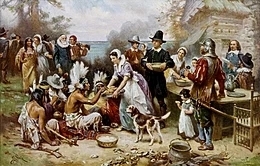 Everyone was dressed in the wrong clothes and the table wasn’t there.
Everyone was dressed in the wrong clothes and the table wasn’t there.
Sad to say, a lot of people think like Charlie Anderson in the 1965 film and don’t know who or what to thank on this day. Thanksgiving is a harvest festival that might have been first celebrated in 1621 by the Pilgrims and the Wampanoag Nation. The idea still seems fine even though most of us have little to do with the production of crops and see the day as a time spent with family.
Black Friday casts a pall over the holiday because it traditionally marks the Christman shopping season where we all rush out and buy what nobody really wants other than to brag we got it cheap. Every major holiday is sulled up by turning into a commercial farce.
This is a sad Thanksgiving for my wife and me because we normally visit my daughter, her husband, and my two granddaughters on Thanksgiving, but illness is keeping us away.
In many ways, Thanksgiving bothers me because–assuming the first celebration happened as history and legend tell us, the hope and thanks of those days turned into a nightmare for the country’s indigenous people that is still going on today. So, the first Thanksgiving is rather like going over to some new friends’ house and then killing them after dinner and stealing the house.
 But never mind that since most of us have spent many memorable days with family and friends eating a wonderful meal (not counting family members we normally try to avoid), and eating until the football games begin and we fall asleep on first and goal.
But never mind that since most of us have spent many memorable days with family and friends eating a wonderful meal (not counting family members we normally try to avoid), and eating until the football games begin and we fall asleep on first and goal.
Mother often noted when my two brothers and I were growing up, that the meal took hours to make, fifteen minutes to eat, and another hour for cleaning up the kitchen. I still like the turkey drumstick best in spite of the bones in it. And as far as I know, I’ve never touched Stove Top Stuffing. My wife and I make our own and it’s do much better than the mysterious stuff that comes out of a box.
But, I digress. I hope we remember what this holiday celebrates.
–Malcolm
November 22, 2023
Remembering Peter Matthiessen
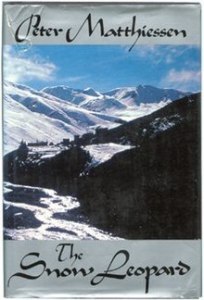 After mentioning a favorite of mine, Peter Matthiessen (May 22, 1927 – April 5, 2014) in yesterday’s post about The Land’s Wild Music, I thought, “Why not talk to Peter, see how he’s doing, find out who he likes in the college football bowl matchups, &c.” Easier said than done. It took me several hours to find my Ouija board. It was under the bed with my Radio Flyer wagon, an old baseball glove, and assorted monsters.
After mentioning a favorite of mine, Peter Matthiessen (May 22, 1927 – April 5, 2014) in yesterday’s post about The Land’s Wild Music, I thought, “Why not talk to Peter, see how he’s doing, find out who he likes in the college football bowl matchups, &c.” Easier said than done. It took me several hours to find my Ouija board. It was under the bed with my Radio Flyer wagon, an old baseball glove, and assorted monsters.
He was happy to have a little conversation and to let me now that he now sees two or three snow leopards every day, something he hoped for in his trek through the Tibetian Plateu in the 1973 with biologist George Shaller, recounted in his 1978 book The Snow Leopard. I’ve read a lot of Matthiessen’s work, but always return to The Snow Leopard as my favorite, winner of the National Book Award in 1979. The current edition has an introduction by Pico Iyer which is fine, but which I skip when reading old classics that are new to me.
I don’t want any help or advice when reading such words as these from the book: “The secret of the mountain is that the mountains simply exist, as I do myself: the mountains exist simply, which I do not. The mountains have no “meaning,” they are meaning; the mountains are. The sun is round. I ring with life, and the mountains ring, and when I can hear it, there is a ringing that we share. I understand all this, not in my mind but in my heart, knowing how meaningless it is to try to capture what cannot be expressed, knowing that mere words will remain when I read it all again, another day.”
I also especially liked At Play in the Fields of the Lord, Blue Meridian, African Silences, Far Tortuga, and In the Spirit of Crazy Horse. As for the last book on my list, Wikipedia says, “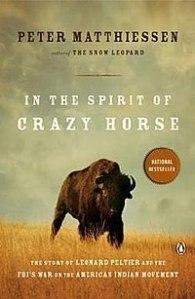 Shortly after the 1983 publication of In the Spirit of Crazy Horse, Matthiessen and his publisher Viking Penguin were sued for libel by David Price, a Federal Bureau of Investigation agent, and William J. Janklow, the former South Dakota governor. The plaintiffs sought over $49 million in damages; Janklow also sued to have all copies of the book withdrawn from bookstores. After four years of litigation, Federal District Court Judge Diana E. Murphy dismissed Price’s lawsuit, upholding Matthiessen’s ‘freedom to develop a thesis, conduct research in an effort to support the thesis, and to publish an entirely one-sided view of people and events.’ In the Janklow case, a South Dakota court also ruled for Matthiessen. Both cases were appealed. In 1990, the Supreme Court refused to hear Price’s arguments, effectively ending his appeal. The South Dakota Supreme Court dismissed Janklow’s case the same year. With the lawsuits concluded, the paperback edition of the book was finally published in 1992.”
Shortly after the 1983 publication of In the Spirit of Crazy Horse, Matthiessen and his publisher Viking Penguin were sued for libel by David Price, a Federal Bureau of Investigation agent, and William J. Janklow, the former South Dakota governor. The plaintiffs sought over $49 million in damages; Janklow also sued to have all copies of the book withdrawn from bookstores. After four years of litigation, Federal District Court Judge Diana E. Murphy dismissed Price’s lawsuit, upholding Matthiessen’s ‘freedom to develop a thesis, conduct research in an effort to support the thesis, and to publish an entirely one-sided view of people and events.’ In the Janklow case, a South Dakota court also ruled for Matthiessen. Both cases were appealed. In 1990, the Supreme Court refused to hear Price’s arguments, effectively ending his appeal. The South Dakota Supreme Court dismissed Janklow’s case the same year. With the lawsuits concluded, the paperback edition of the book was finally published in 1992.”
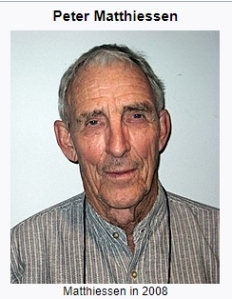 The book focuses on Leoard Peltier’s 1977 murder conviction for purportedly killing two FBI agents during the agency’s misguided attack on the American Indian Movement. I followed the case and agreed with Matthiessen’s assessment. Peltier is still in prison. I don’t think he should be.
The book focuses on Leoard Peltier’s 1977 murder conviction for purportedly killing two FBI agents during the agency’s misguided attack on the American Indian Movement. I followed the case and agreed with Matthiessen’s assessment. Peltier is still in prison. I don’t think he should be.
Wikipedia writes: “In 2008, at age 81, Matthiessen received the National Book Award for Fiction for Shadow Country, a one-volume, 890-page revision of his three novels set in frontier Florida that had been published in the 1990s. According to critic Michael Dirda, ‘No one writes more lyrically [than Matthiessen] about animals or describes more movingly the spiritual experience of mountaintops, savannas, and the sea.'” I agree.
–Malcolm
November 21, 2023
‘The Land’s Wild Music: Encounters with Barry Lopez, Peter Matthiessen, Terry Tempest Williams, and James Galvin’ by Mark Tredinnick
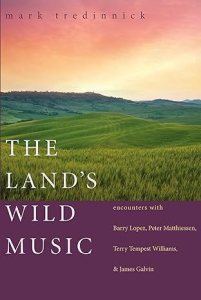 I should have read this book sooner because I would like to talk to Barry Lopez (via Ouija Board), Peter Matthiessen (same Ouija board), James Galvin, and Terry Tempest Williams. And also, I like the wild music the land sings to us when we walk slowly and listen. The awareness one finds when listening to Earth’s music and, perhaps, the Creator’s music is what I was talking about in yesterday’s post about “gnosis.” That music is more difficult to hear inside a building, no matter how sacred the structure.
I should have read this book sooner because I would like to talk to Barry Lopez (via Ouija Board), Peter Matthiessen (same Ouija board), James Galvin, and Terry Tempest Williams. And also, I like the wild music the land sings to us when we walk slowly and listen. The awareness one finds when listening to Earth’s music and, perhaps, the Creator’s music is what I was talking about in yesterday’s post about “gnosis.” That music is more difficult to hear inside a building, no matter how sacred the structure.
“‘The Land’s Wild Music’ explores the home terrains and the writing of four great American writers of place―Barry Lopez, Peter Matthiessen, Terry Tempest Williams, and James Galvin. In their work and its relationship with their home places, Tredinnick, an Australian writer, searches for answers to such questions such as whether it’s possible for a writer to make an authentic witness of a place; how one captures the landscape as it truly is; and how one joins the place in witness so that its lyric becomes one’s own and enters into one’s own work. He asks what it might mean to enact an ecological imagination of the world and whether it might be possible to see the work―and the writer―as part of the place itself. The work is a meditation on the nature of landscape and its power to shape the lives and syntax of men and women. It is animated by the author’s encounters with Lopez, Matthiessen, Williams, and Galvin, by critical readings of their work, and by the author’s engagement with the landscapes that have shaped these writers and their writing―the Cascades, Long Island, the Colorado Plateau, and the high prairies of the Rocky Mountains. Tredinnick seeks “the spring of nature writing deep in the nature of a place itself, carried in a writer’s wild self inside and resonated over and over again at the desk until it is a work in which the place itself sings.”
About the Author Mark Tredinnick is an essayist, poet, and writing teacher. He is the author of The Blue Plateau: A Landscape Memoir and the editor of A Place on Earth: An Anthology of Nature Writing from Australia and North America. His essays and journalism have appeared in Island, ISLE, Orion, Resurgence, the Bulletin, and the Sydney Morning Herald. Winner of the 2005 Wildcare Tasmania Nature Writing Prize, Tredinnick lives in the highlands southwest of Sydney, Australia.
Mark Tredinnick is an essayist, poet, and writing teacher. He is the author of The Blue Plateau: A Landscape Memoir and the editor of A Place on Earth: An Anthology of Nature Writing from Australia and North America. His essays and journalism have appeared in Island, ISLE, Orion, Resurgence, the Bulletin, and the Sydney Morning Herald. Winner of the 2005 Wildcare Tasmania Nature Writing Prize, Tredinnick lives in the highlands southwest of Sydney, Australia.
–Malcolm
November 20, 2023
Gnosis
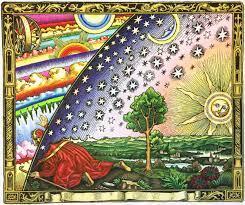 When some people think of religious gnostics, they consider the 12th-century Cathars in Europe who, among other things, believed in truth that came from awareness rather than through the dogma of a hierarchy. The Catholic Church, by edict of Pope Innocent III–who seems to me to be very un-innocent–wiped out this group in 1229 through the genocidal Albigensian Crusade. Rome wanted a hierarchy with engraved-in-stone rules and anything else was called a heresy.
When some people think of religious gnostics, they consider the 12th-century Cathars in Europe who, among other things, believed in truth that came from awareness rather than through the dogma of a hierarchy. The Catholic Church, by edict of Pope Innocent III–who seems to me to be very un-innocent–wiped out this group in 1229 through the genocidal Albigensian Crusade. Rome wanted a hierarchy with engraved-in-stone rules and anything else was called a heresy.
I interpret gnosis as awareness and think that those of us who think that awareness makes more sense that a hierarchy of preachers often get bad PR because people are quick to list the other beliefs of the Cathars which seem very strange to me. If you watched the TV show “The Waltons” you may remember that the father didn’t feel his beliefs came from a church but through contemplation within nature. I feel the same way.
My distrust of authority included that of the church fathers–the elders and the deacons in the Presbyterian Church where I grew up. Sunday school and vacation Bible school teachers found me a challenge because I thought every person should find the truth in his/her own way and not through the promptings of teachers and pastors.
I was proud of the pastor of our church for threatening to leave if the church did not allow African Americans to attend. The church elders did not fight him on this, and we had a good many African Americans who came, (a) to see if they could, and (b) to see what was happening. Most did not come back because (if I may say so myself, Presbyterians are the most boring of all denominations) “nothing was happening.” They invited us to their church which presented an exciting experience!
At any rate, the Sunday school and Vacation Bible school teachers didn’t want me in their classes because they knew I was “trouble.” My poor parents heard more of their “concern” than I did, their son, for example, saying that the doctrine of predestination was preposterous. I said if the doctrine was true, we were all going to Heaven or Hell no matter what we did because our fate was already decided. The teachers had no answer for that. Now, I think the Presbyterians have moved away from that belief.
My teachers said I came to class to learn how to act within the scope of Christian beliefs. I said I already knew that and didn’t need another person presuming to tell me. That never went well. I maintained that we were taught to pray and to listen for a response. What more could we need?
And like John Walton on the long-running TV show, I found more answers in nature than in a building where I was told what to think and believe. That’s gnosis and it combines with mysticism for individual transformation and knowledge.
–Malcolm
November 19, 2023
‘River of the Gods: Genius, Courage, and Betrayal in the Search for the Source of the Nile,’ by Candice Millard
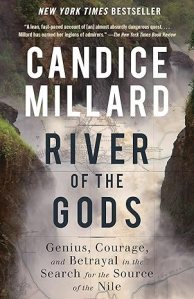 One benefit of exchanging pen-pal-style emails with an old friend who reads as many books as I do is hearing about new books I might have overlooked. In the 1960s, we were hiking partners in the Rocky Mountains; neither of us suspected then that we’d be writing to each other this many years later. Her latest recommendation is River of Gods, and it’s a good one. It reminds me of my high school history classes that include a lot of material about explorers in Africa.
One benefit of exchanging pen-pal-style emails with an old friend who reads as many books as I do is hearing about new books I might have overlooked. In the 1960s, we were hiking partners in the Rocky Mountains; neither of us suspected then that we’d be writing to each other this many years later. Her latest recommendation is River of Gods, and it’s a good one. It reminds me of my high school history classes that include a lot of material about explorers in Africa.
I definitely agree with the New York Times Book Review comment that “River of the Gods is a lean, fast-paced account of the almost absurdly dangerous quest by [Richard Burton and John Speke] to solve the geographic riddle of their era. . . Candice Millard has earned her legions of admirers. She is a graceful writer and a careful researcher, and she knows how to navigate a tangled tale.”
From the Publisher“For millennia the location of the Nile River’s headwaters was shrouded in mystery. In the 19th century, there was a frenzy of interest in ancient Egypt. At the same time, European powers sent off waves of explorations intended to map the unknown corners of the globe – and extend their colonial empires.
“Richard Burton and John Hanning Speke were sent by the Royal Geographical Society to claim the prize for England. Burton spoke twenty-nine languages, and was a decorated soldier. He was also mercurial, subtle, and an iconoclastic atheist. Speke was a young aristocrat and Army officer determined to make his mark, passionate about hunting, Burton’s opposite in temperament and beliefs.
“From the start, the two men clashed. They would endure tremendous hardships, illness, and constant setbacks. Two years in, deep in the African interior, Burton became too sick to press on, but Speke did and claimed he found the source in a great lake that he christened Lake Victoria. When they returned to England, Speke rushed to take credit, disparaging Burton. Burton disputed his claim, and Speke launched another expedition to Africa to prove it. The two became venomous enemies, with the public siding with the more charismatic Burton, to Speke’s great envy. The day before they were to publicly debate, Speke shot himself.
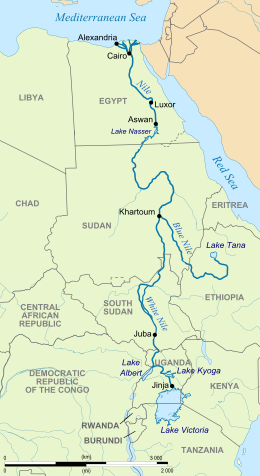 “Yet there was a third man on both expeditions, his name obscured by imperial annals, whose exploits were even more extraordinary. This was Sidi Mubarak Bombay, who was enslaved and shipped from his home village in East Africa to India. When the man who purchased him died, he made his way into the local Sultan’s army and eventually traveled back to Africa, where he used his resourcefulness, linguistic prowess, and raw courage to forge a living as a guide. Without Bombay and men like him, who led, carried, and protected the expedition, neither Englishman would have come close to the headwaters of the Nile, or perhaps even survived.
“Yet there was a third man on both expeditions, his name obscured by imperial annals, whose exploits were even more extraordinary. This was Sidi Mubarak Bombay, who was enslaved and shipped from his home village in East Africa to India. When the man who purchased him died, he made his way into the local Sultan’s army and eventually traveled back to Africa, where he used his resourcefulness, linguistic prowess, and raw courage to forge a living as a guide. Without Bombay and men like him, who led, carried, and protected the expedition, neither Englishman would have come close to the headwaters of the Nile, or perhaps even survived.
“In River of the Gods, Candice Millard has written another peerless story of courage and adventure, set against the backdrop of the race to exploit Africa by the colonial powers.”
Book Page ReviewThe Nile’s mythic reputation as the longest river in Africa, and arguably the world, once inspired generations of European explorers to seek its source—and exploit Africa’s vast resources in the process. Now, thanks to this richly detailed story well told by historian Candice Millard, a colorful and controversial chapter in world history resurfaces. In River of the Gods: Genius, Courage, and Betrayal in the Search for the Source of the Nile, 19th-century explorers’ egos loom godlike over expeditions, their abused local guides save lives and prompt discoveries, and the second largest continent on Earth finally gets mapped.
–Malcolm
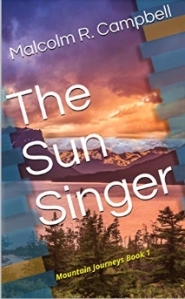 Malcolm R. Campbell is the author of the contemporary fantasy “The Sun Singer.”
Malcolm R. Campbell is the author of the contemporary fantasy “The Sun Singer.”
November 16, 2023
Well-Read Parents Might Be Dangerous
When well-read parents own a lot of books–mine had several thousand or more–multiple ideas lurk on those shelves like landmines and/or philosopher’s stones waiting for curious kids to find. I found plenty. Whether or not I found these by my folks’ and mischievous spirits’ designs or by coincidence when I was ready to read them, I don’t know except to say that I don’t believe in coincidences.
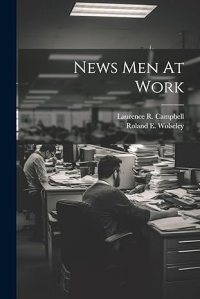 Both of my parents were high school student publications advisers and my dad was a college journalism dean and the author of journalism textbooks. So, I became a writer, a college journalism instructor, and an adviser for a college’s student newspaper. Like my father, I ultimately married one of my students. My father’s journalism school and my journalism program were both destroyed by politics, though our marriages endured.
Both of my parents were high school student publications advisers and my dad was a college journalism dean and the author of journalism textbooks. So, I became a writer, a college journalism instructor, and an adviser for a college’s student newspaper. Like my father, I ultimately married one of my students. My father’s journalism school and my journalism program were both destroyed by politics, though our marriages endured.
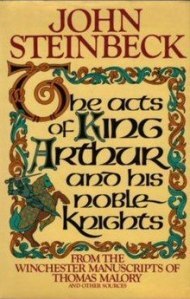 My long-time interest in King Arthur and the Grail romances began when I found John Steinbeck’s posthumously published The Acts of King Arthur and his Noble Knights on the shelf. After discovering that book, I went on to read everything I could find about King Arthur who, strange as it may seem, actually appears in the genealogy of the Clan Campbell family in Scotland.
My long-time interest in King Arthur and the Grail romances began when I found John Steinbeck’s posthumously published The Acts of King Arthur and his Noble Knights on the shelf. After discovering that book, I went on to read everything I could find about King Arthur who, strange as it may seem, actually appears in the genealogy of the Clan Campbell family in Scotland.
 I’ve written often here about magic and ancient mysteries books, and without a doubt that interest began with James Allen’s 1903 book As a Man Thinketh. Over time, the beliefs in that book changed my life.
I’ve written often here about magic and ancient mysteries books, and without a doubt that interest began with James Allen’s 1903 book As a Man Thinketh. Over time, the beliefs in that book changed my life.
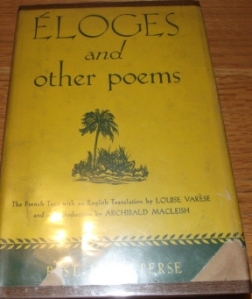 My favorite poet St.-John Perse came into my consciousness when I found a 1944 book published in English and French called Éloges and Other Poems. I remember my college English teacher who threw me out of class for disagreeing with him about the value of journalism, telling me, talk to me after you know about poets like St.-John Perse. I showed him a copy of this book at the next meeting of the class. “This has been in my family since the year I was born. Any questions?” He wanted to buy the copy which I said belonged to my mother and was not for sale. Nonetheless, I was re-admitted to the class. I don’t deal well with know-it-all English teachers, especially those who say journalistic writing is bad writing.
My favorite poet St.-John Perse came into my consciousness when I found a 1944 book published in English and French called Éloges and Other Poems. I remember my college English teacher who threw me out of class for disagreeing with him about the value of journalism, telling me, talk to me after you know about poets like St.-John Perse. I showed him a copy of this book at the next meeting of the class. “This has been in my family since the year I was born. Any questions?” He wanted to buy the copy which I said belonged to my mother and was not for sale. Nonetheless, I was re-admitted to the class. I don’t deal well with know-it-all English teachers, especially those who say journalistic writing is bad writing.
Perhaps you remember finding some of your parents’ books that influenced your interests years later. I hope so. My parents and I disagreed about a lot of things, many of which stemmed from their books left out in the open on the family’s shelves. Ironic, I think.
I never really needed a library because all I could ever want was under my own roof–for better or worse.
–Malcolm
November 15, 2023
I don’t understand women
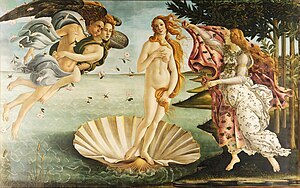 If you’re a woman, you’re probably thinking, “Of course you don’t, you subhuman ape.”
If you’re a woman, you’re probably thinking, “Of course you don’t, you subhuman ape.”
If you’re a man, you’re probably thinking, “Join the club.”
But I have something specific in mind, a seeming paradox that only women can answer. Men have for years leered at scantily-clad women and have been lambasted by women for doing so.
Now, on almost a daily basis, I read in the mainstream media that an actress or other celebrity has “rocked” an almost-there outfit. These outfits would probably get them arrested in most places, but on the red carpet for one event or another, appearing nude or nearly nude is the way of things.
But why? Are the women doing this celebrating their right to dress as they please. If so, why are they dressing in the way they hated men for wanting?
As a man, I think women dressed in almost nothing look like they came out of a brothel. Is this the new freedom? If so, it’s odd that it matches what men always wanted and were disliked for wanting. So what’s going on here?
Men are “in trouble” for wanting women to look like sluts and women are now dressing as sluts. I don’t understand this.
I you understand it, please tell me what’s going on here.
–Malcolm
November 14, 2023
‘Wisdom of the Mystic Masters’ by Joseph Weed
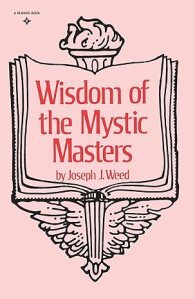 Once upon a time, when I was starting to take my curiosity about esoteric subjects seriously, I read Wisdom of the Mystic Masters and other books by Rosicrucian author Joseph Weed. As a Rosicrucian, Weed was no doubt aware of the fact that the road to mastery is a long road. So, in looking back on these books, I’m surprised at how they were so blatantly oversold (this reminds me of The Secret) in that they implied all you had to do was read a popular account of ancient lore and soon thereafter you would become all-powerful and quasi-divine. Like The Secret, these books came and went quickly because–while there was truth in them–it could not be learned and perfected during the halftime show of the football game that had taken over the living room’s TV set.
Once upon a time, when I was starting to take my curiosity about esoteric subjects seriously, I read Wisdom of the Mystic Masters and other books by Rosicrucian author Joseph Weed. As a Rosicrucian, Weed was no doubt aware of the fact that the road to mastery is a long road. So, in looking back on these books, I’m surprised at how they were so blatantly oversold (this reminds me of The Secret) in that they implied all you had to do was read a popular account of ancient lore and soon thereafter you would become all-powerful and quasi-divine. Like The Secret, these books came and went quickly because–while there was truth in them–it could not be learned and perfected during the halftime show of the football game that had taken over the living room’s TV set.
“This book contains the most awesome secrets ever known to man—ready to be used by you to attain the riches, influence, and joy you’ve always wanted! By using the staggering power of these age-old secrets—jealously guarded by the wealthiest and most influential people in history—you’ll quickly discover how to release a flood of riches into your life… how to gain influence and control over others… bring new romance into your marriage or social life… gain the instant respect of everyone you meet… overcome any threat that faces you now!
“Here is the ancient might of the Mystic Masters immediately ready to help you to the pinnacle of money, fame, and power!”
One thing I noticed with these descriptions right away is that many of them focus on obtaining wealth and power, the very opposite of what hermetic studies are all about. Obviously, the publishers don’t think “the masses” will read such books to become more spiritual, more aware of the “big picture,” or to improve themselves. So they promise fame and fortune.
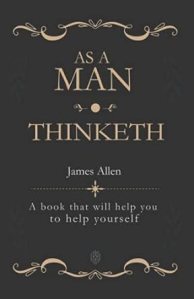 If you look closely at what these hyped books offer, it’s very similar to what James Allen wrote years ago in his wonderful 1903 book As a Man Thinketh. My father had this book on the family’s shelves and I read it long before I’d ever heard of Weed. From the book of Proverbs. Chapter 23, it is written, “As a man thinketh in his heart, so is he.” In my view, this is all we need to know. No hype is needed.
If you look closely at what these hyped books offer, it’s very similar to what James Allen wrote years ago in his wonderful 1903 book As a Man Thinketh. My father had this book on the family’s shelves and I read it long before I’d ever heard of Weed. From the book of Proverbs. Chapter 23, it is written, “As a man thinketh in his heart, so is he.” In my view, this is all we need to know. No hype is needed.
You can read Allen’s book, now in the public domain, on Project Guttenberg here.
The paradox here is that the wisdom itself is simple, but its development is complex. And that’s what makes the hype work so well on prospective readers. Read “this” and you will know “all.” Perhaps so. Then what?
November 12, 2023
Potpourri for Sunday, 11/12/23
Unlike real potpourri, this post won’t make you sneeze. If it does, please consult a psychologist or, possibly, a conjure woman.
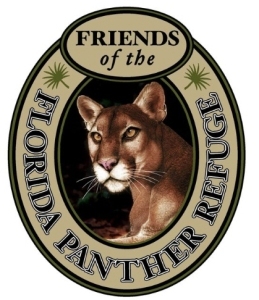 Since I grew up in Florida, I see the Florida Panther as “Florida’s Buffalo.” They used to be found throughout the Southeast. When my family moved to Florida in 1950, they were still roaming throughout the Florida Panhandle. Now, those that remain are confined (mostly) to a refuge in South Florida just north of Alligator Alley. In the old days, there was a bounty on them for about the same reasons there’s often a bounty on wolves–a threat to livestock. Now, development is the primary threat to the Panther. You can become a member of the Friends of the Florida Panther for $25. I’m happy to say I have seen one. Magnificent! Sadly, it was in an outdoor zoo.
Since I grew up in Florida, I see the Florida Panther as “Florida’s Buffalo.” They used to be found throughout the Southeast. When my family moved to Florida in 1950, they were still roaming throughout the Florida Panhandle. Now, those that remain are confined (mostly) to a refuge in South Florida just north of Alligator Alley. In the old days, there was a bounty on them for about the same reasons there’s often a bounty on wolves–a threat to livestock. Now, development is the primary threat to the Panther. You can become a member of the Friends of the Florida Panther for $25. I’m happy to say I have seen one. Magnificent! Sadly, it was in an outdoor zoo. I hope most people take a moment or so to think about Veterans Day. I like this poster from 2018 because it brings back the ambiance of the time when the holiday was created as Armistice Day in 1938, before expanding into Veterans Day in 1954. I called it Armistice Day for years because that was its name when I was a kid. I know this is “flip,” but we kept saying “Armistice Day” and “Boulder Dam” instead of “Hoover Dam” for the same reason that many of us still refer to aluminum foil as “tin foil.” The name doesn’t matter as much as an acknowledgment that we owe a lot to those who came home.
I hope most people take a moment or so to think about Veterans Day. I like this poster from 2018 because it brings back the ambiance of the time when the holiday was created as Armistice Day in 1938, before expanding into Veterans Day in 1954. I called it Armistice Day for years because that was its name when I was a kid. I know this is “flip,” but we kept saying “Armistice Day” and “Boulder Dam” instead of “Hoover Dam” for the same reason that many of us still refer to aluminum foil as “tin foil.” The name doesn’t matter as much as an acknowledgment that we owe a lot to those who came home. 1922 Ad
1922 Ad
As was thinking over the old names that got engraved in stone, I realized that many of my friends (and sometimes me, horrors) still refer to the refrigerator as the “ice box.” Yes, we called our Frigidaire the ice box when were were kids because ice boxes were still common. My parents bought our Frigidaire when the brand was still made by General Motors and, it was still running many decades later (outlasting my parents). Now, like the word “cellophane,” often used to refer to any clear wrap, many people call their refrigerator a Fridge even though it’s not a Frigidaire. It’s rather like calling any facial tissue a “Kleenex.” We always use Kleenex so we’re in the clear when we refer to our tissues and “Kleenex.”
 As I continue re-reading Holy Blood, Holy Grail, I wonder how many of the “hoaxes” (or unproven speculations) in the book and Dan Brown’s subsequent novel are really hoaxes and how many are coverups for organizations that really exist. (Nothing to see here, that’s all been faked.) For example, the Priory of Sion (which some say was the parent of the Knights Templar and which others say was founded in 1956 and made to appear older than it was), probably wasn’t the nasty child of the Vatican as portrayed in The Da Vinci Code. Well, fooey. But unlike the real or imagined Priory, I do think the evidence suggesting Mary Magdalen probably was Jesus’ wife is correct. Margaret Starbird’s The Woman with the Alabaster Jar is for me, the most definitive on that point.
As I continue re-reading Holy Blood, Holy Grail, I wonder how many of the “hoaxes” (or unproven speculations) in the book and Dan Brown’s subsequent novel are really hoaxes and how many are coverups for organizations that really exist. (Nothing to see here, that’s all been faked.) For example, the Priory of Sion (which some say was the parent of the Knights Templar and which others say was founded in 1956 and made to appear older than it was), probably wasn’t the nasty child of the Vatican as portrayed in The Da Vinci Code. Well, fooey. But unlike the real or imagined Priory, I do think the evidence suggesting Mary Magdalen probably was Jesus’ wife is correct. Margaret Starbird’s The Woman with the Alabaster Jar is for me, the most definitive on that point.–Malcolm
November 11, 2023
Those ubiquitous Templars
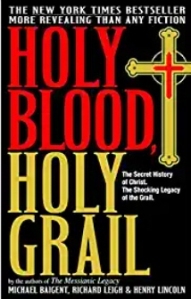 I’m re-reading for the second or third time Holy Blood, Holy Grail by Baigent, Leigh, and Lincoln because the subject matter is fascinating. I’ve lost track of all the Templar-related books I’ve read, not counting Dan Brown’s The Da Vinci Code.
I’m re-reading for the second or third time Holy Blood, Holy Grail by Baigent, Leigh, and Lincoln because the subject matter is fascinating. I’ve lost track of all the Templar-related books I’ve read, not counting Dan Brown’s The Da Vinci Code.
When I was twelve, I joined the DeMolay Club affiliated with my school because I liked its values which are related to the values of the Masons. Unfortunately, I had to leave when their chosen meeting day conflicted with the meeting day of my Scout group. Jacques de Molay was the last grandmaster of the Knights Templar before the group was virtually destroyed by the French king and the Pope in 1307.
Prior to that, when visiting my grandparents in Illinois, I first heard those values from my grandfather who was the commander of the local Masons which were affiliated with The Knights Templar of North America. The commandery, the building of the local Ilinois chapter, was a wonderous place and I was tempted to become a Mason after hearing about the values of the group. I chose instead to join the Rosicrucian Order because of its strong commitment to esoteric teachings. I did not think I should also become a Mason, though they have my support.
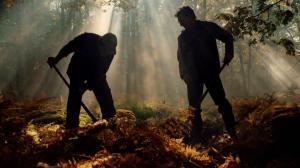 History Channel Photo
History Channel Photo
Now as I watch the ongoing coverage of the treasure hunters on Oak Island, I find it interesting that the team doing the work there is excited about the possible Templar connection to the treasure that might have been hidden there. I have zero interest in treasure, but I’m drawn to this show because I’m curious about the potential connection between the Knights Templar and what, if anything, is ultimately found on this privately-owned island off the coast of Nova Scotia.
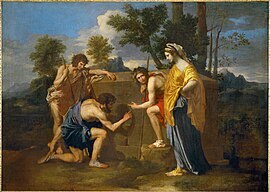 Re-reading this book brings back many memories of the research I did in the past into such subjects as the work of artist Nicolas Poussin (1594–1665), especially his two paintings labelled Et in Arcadia ego which are also mentioned in the books of the Francis Bacon Research Trust. Arcadia represents, is it said, heaven on earth and yet the coffin in the painting suggests the presence of a darker side. The prospective bloood line of Christ, notably in the French Merovingan dynasty and the Plantard family is also interesting.
Re-reading this book brings back many memories of the research I did in the past into such subjects as the work of artist Nicolas Poussin (1594–1665), especially his two paintings labelled Et in Arcadia ego which are also mentioned in the books of the Francis Bacon Research Trust. Arcadia represents, is it said, heaven on earth and yet the coffin in the painting suggests the presence of a darker side. The prospective bloood line of Christ, notably in the French Merovingan dynasty and the Plantard family is also interesting.
How many of these mysteries are real and how many are pure fiction. I may never know. But I like delving into real or imagined secrets.
–Malcolm



